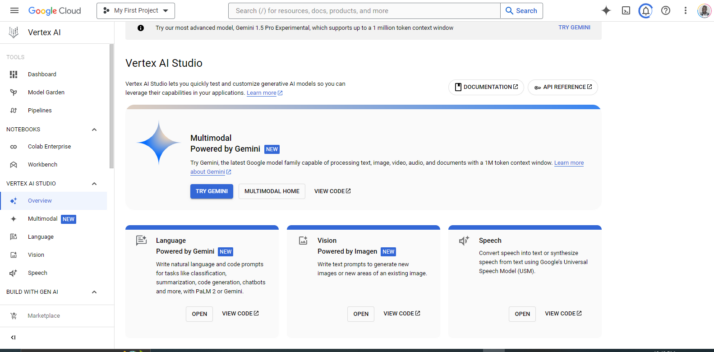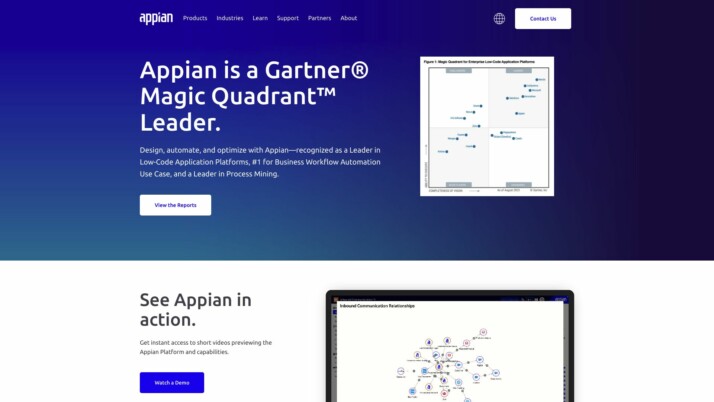Vertex AI vs. Appian: Which A.I. Platform Fits Your Business?
AI platforms revolutionize how businesses harness advanced technologies, but choosing the right solution can be daunting. This comparison of Vertex AI vs. Appian, and SmythOS illuminates the strengths and limitations of each platform. We’ll explore how Vertex AI’s comprehensive machine learning capabilities, Appian’s low-code approach, and SmythOS’s versatile agent-building tools cater to different needs. Whether you’re a seasoned developer, a business leader, or an AI enthusiast, this analysis will help you navigate the landscape of AI integration and development. Discover which platform aligns best with your goals, from advanced model creation to streamlined workflow automation, and learn how each can drive innovation in your organization.
Vertex AI Overview
Vertex AI empowers developers and businesses to build, deploy, and manage machine learning models at scale. Google’s comprehensive platform integrates cutting-edge AI capabilities with robust cloud infrastructure, streamlining the entire ML lifecycle. Vertex AI caters to data scientists, ML engineers, and enterprises seeking to harness the power of AI for diverse applications.
The platform’s cornerstone is its suite of advanced AI models, including the multimodal Gemini. These models excel at tasks ranging from natural language processing to image generation, enabling users to create sophisticated AI agents and applications. Vertex AI’s Model Garden provides access to a wide array of pre-trained models, allowing for rapid prototyping and deployment of AI solutions.


Screenshot from Vertex AI studio.
Vertex AI distinguishes itself through its seamless integration with Google Cloud services, offering unparalleled scalability and performance.
Vertex AI distinguishes itself through its seamless integration with Google Cloud services, offering unparalleled scalability and performance. The platform’s MLOps tools facilitate efficient model management, monitoring, and deployment, ensuring AI projects move smoothly from development to production. While Vertex AI provides powerful capabilities, it requires a certain level of technical expertise, potentially presenting a steeper learning curve for non-technical users compared to some no-code alternatives.
Security and compliance are paramount in Vertex AI’s design, with features like data encryption and access controls built-in. The platform’s commitment to responsible AI is evident in its Explainable AI tools, which provide insights into model decision-making processes. This transparency is crucial for industries where AI accountability is essential, such as healthcare and finance.
Vertex AI’s ecosystem extends beyond model development, offering specialized tools like Vertex AI Workbench for collaborative development and Vertex AI Feature Store for efficient feature management. These components create a cohesive environment that supports the entire AI development process, from data preparation to model serving. While Vertex AI excels in many areas, users should consider their specific needs and resources when evaluating its fit for their projects.
Appian Overview
Appian revolutionizes AI integration for businesses through its low-code platform. The software empowers organizations to harness AI capabilities without extensive data science expertise, making advanced technology accessible across industries.
The Appian platform excels in seamlessly incorporating AI into existing business processes. Its low-code AI integration allows rapid development and deployment of custom AI and machine learning models. This approach democratizes AI, enabling non-specialists to create sophisticated solutions quickly.


Appian Website Screenshot
Appian revolutionizes AI integration for businesses through its low-code platform. The software empowers organizations to harness AI capabilities without extensive data science expertise…
Appian’s suite of prebuilt AI capabilities includes document classification, data extraction, email sorting, and generative AI skills. These features enhance automation processes, streamlining tasks like document management and communication. The platform’s integration with advanced language models like OpenAI/ChatGPT further amplifies its natural language processing abilities.
Privacy and security stand out as key strengths of Appian’s offering. The platform ensures AI models and data remain under the user’s control, addressing critical concerns about data protection in AI implementations. This commitment to privacy makes Appian particularly attractive for businesses handling sensitive information.
While Appian provides powerful AI integration tools, it may present a learning curve for users new to low-code platforms. The software’s enterprise focus might also make it less suitable for small-scale projects or individual developers seeking simpler AI solutions. However, for businesses looking to enhance their operations with AI, Appian offers a robust, secure, and flexible platform to drive innovation and efficiency.
Feature Comparison
Vertex AI and Appian offer distinct approaches to AI integration, each with its own strengths and limitations. Vertex AI excels in providing a comprehensive machine learning platform with advanced model development capabilities. It supports the creation and deployment of sophisticated AI models, including multimodal generative AI like Gemini. Vertex AI’s integration with Google Cloud services ensures robust scalability and performance, making it ideal for large-scale enterprise applications.
Appian, on the other hand, focuses on making AI accessible through its low-code platform. It simplifies AI integration into business processes, allowing non-specialists to leverage AI capabilities quickly. Appian’s strength lies in its prebuilt AI features and process automation tools, which enable rapid deployment of AI-enhanced workflows. However, it may lack the depth of customization and advanced model development options that Vertex AI offers.
In terms of security, both platforms prioritize data protection, but their approaches differ. Vertex AI provides extensive security features integrated with Google Cloud’s infrastructure, while Appian emphasizes keeping AI models and data under the user’s control. This distinction may be crucial for organizations with specific data sovereignty requirements.
Feature Comparison Table
| Vertex AI | Appian | SmythOS | |
|---|---|---|---|
| CORE FEATURES | |||
| Hosted Agents (Dev, Production) | ✅ | ❌ | ✅ |
| No-Code Options | ❌ | ✅ | ✅ |
| Autonomous Agents | ✅ | ❌ | ✅ |
| Multi-Agent Collaboration | ✅ | ❌ | ✅ |
| Audit Logs for Analytics | ❌ | ✅ | ✅ |
| Agent Work Scheduler | ✅ | ❌ | ✅ |
| SECURITY | |||
| COMPONENTS | |||
| Foundation AIs | ✅ | ❌ | ✅ |
| Huggingface AIs | ❌ | ❌ | ✅ |
| Zapier APIs | ❌ | ❌ | ✅ |
| DEPLOYMENT OPTIONS (EMBODIMENTS) | |||
| Deploy as Site Chat | ✅ | ❌ | ✅ |
| Deploy as Scheduled Agent | ✅ | ❌ | ✅ |
| Deploy as GPT | ✅ | ❌ | ✅ |
| DATA LAKE SUPPORT | |||
| Hosted Vector Database | ✅ | ❌ | ✅ |
| Sitemap Crawler | ❌ | ❌ | ✅ |
| YouTube Transcript Crawler | ❌ | ❌ | ✅ |
| URL Crawler | ✅ | ❌ | ✅ |
Best Alternative to Vertex AI and Appian
SmythOS stands out as the superior alternative to Vertex AI and Appian, offering a comprehensive AI automation platform that combines ease of use, extensive features, and unlimited use cases. Our platform empowers users to create and deploy AI agents with unprecedented speed and flexibility.
Unlike Vertex AI’s complex machine learning focus or Appian’s limited low-code approach, SmythOS provides a intuitive drag-and-drop interface that makes AI development accessible to both technical and non-technical users. We offer a vast array of pre-built components and integrations, allowing for rapid prototyping and deployment of sophisticated AI solutions without sacrificing customization options.
SmythOS excels in multi-agent collaboration… Our platform enables the creation of interconnected AI ecosystems where multiple agents work together seamlessly, tackling complex tasks with greater efficiency.
SmythOS excels in multi-agent collaboration, a critical feature lacking in Appian and limited in Vertex AI. Our platform enables the creation of interconnected AI ecosystems where multiple agents work together seamlessly, tackling complex tasks with greater efficiency. This capability opens up new possibilities for automation and decision-making processes across various industries.
We prioritize scalability and performance, ensuring that AI solutions built with SmythOS can grow alongside your business needs. Our hosted vector database and support for various data types, including sitemaps, YouTube transcripts, and PDFs, provide a robust foundation for handling diverse data sources. This versatility surpasses the more rigid data management approaches of Vertex AI and Appian.
With SmythOS, we’ve revolutionized AI deployment options. Our platform supports multiple embodiments, including API endpoints, webhooks, scheduled agents, and even deployment as GPTs. This flexibility allows for seamless integration into existing workflows and the creation of AI-powered applications that can be accessed through various channels, setting us apart from the more limited deployment options offered by our competitors.
Conclusion
Vertex AI, Appian, and SmythOS each offer unique approaches to AI integration and development. Vertex AI excels in providing a comprehensive machine learning platform with advanced capabilities, particularly suited for enterprises deeply invested in Google’s ecosystem. Appian stands out with its low-code approach, making AI accessible to businesses looking to enhance their workflows without extensive technical expertise.
However, SmythOS emerges as the superior choice, combining the best of both worlds with its versatile and user-friendly platform. Our drag-and-drop interface surpasses Appian’s low-code approach, allowing for even more intuitive AI agent creation. Unlike Vertex AI’s steep learning curve, SmythOS democratizes AI development, making it accessible to both technical and non-technical users alike.
SmythOS’s extensive integration ecosystem, supporting over 300,000 integrations, outshines both competitors. This flexibility ensures seamless incorporation into existing business processes, regardless of the tools or platforms in use. Our multi-agent orchestration and versatile deployment options, including the ability to deploy agents as APIs, chatbots, or scheduled tasks, provide unparalleled adaptability for diverse business needs.
For those ready to experience the future of AI development and deployment, we invite you to explore our diverse range of AI-powered agent templates. These templates cover multiple business categories and offer a quick start to revolutionizing your workflows. To truly unleash the power of AI for your business, create a free SmythOS account and start building AI agents with no time limit. With our 30-day money-back guarantee, you can automate anything risk-free and discover how SmythOS can transform your approach to AI integration and development.
Last updated:
Disclaimer: The information presented in this article is for general informational purposes only and is provided as is. While we strive to keep the content up-to-date and accurate, we make no representations or warranties of any kind, express or implied, about the completeness, accuracy, reliability, suitability, or availability of the information contained in this article.
Any reliance you place on such information is strictly at your own risk. We reserve the right to make additions, deletions, or modifications to the contents of this article at any time without prior notice.
In no event will we be liable for any loss or damage including without limitation, indirect or consequential loss or damage, or any loss or damage whatsoever arising from loss of data, profits, or any other loss not specified herein arising out of, or in connection with, the use of this article.
Despite our best efforts, this article may contain oversights, errors, or omissions. If you notice any inaccuracies or have concerns about the content, please report them through our content feedback form. Your input helps us maintain the quality and reliability of our information.
